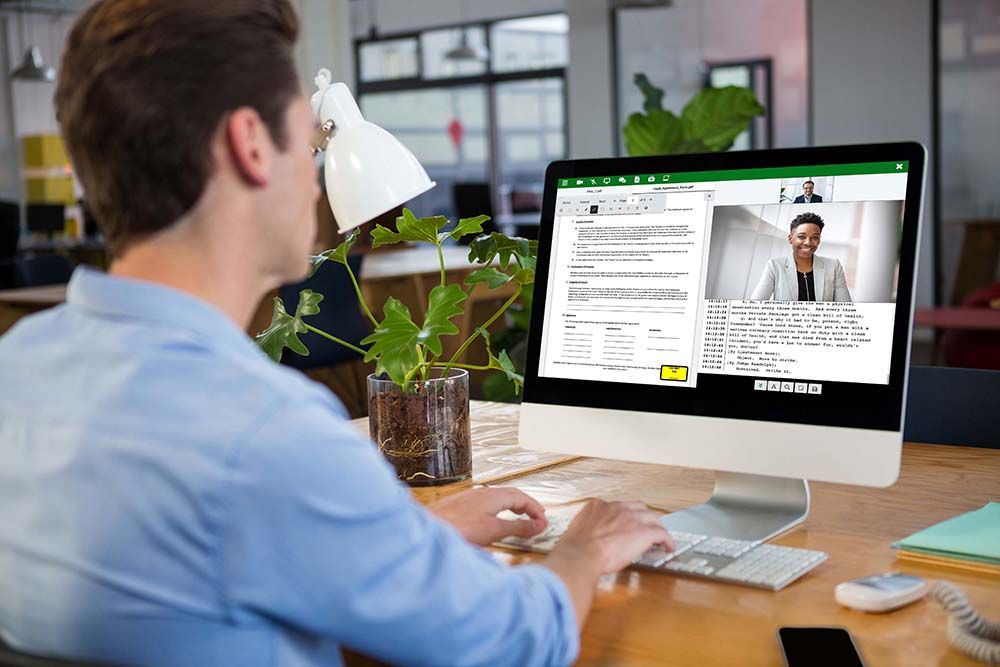Navigating the Future of Legal Proceedings With Seamless Remote Depositions Solutions
The landscape of legal process is quickly developing, with remote depositions becoming a noticeable function in this transformation. As modern technology remains to advance, the integration of seamless services for remote depositions has actually ended up being important for attorneys looking for effective and cost-effective methods to conduct depositions. Nonetheless, the path to totally accepting this change is not without its difficulties and factors to consider. By exploring the ins and outs of navigating the future of legal process through smooth remote deposition solutions, a clearer understanding of the possibilities and complexities that lie in advance can be acquired.
The Surge of Remote Depositions
This change has actually been mostly driven by the requirement for adaptability, effectiveness, and cost-effectiveness in lawful process (REMOTE DEPOSITIONS). Remote depositions allow lawyers, witnesses, and court press reporters to take part from different areas, getting rid of the need for physical presence in a details deposition space.
Furthermore, the developments in video clip conferencing systems and digital devices have boosted the general experience of remote depositions, guaranteeing clear audio-visual interaction and safe documentation of testaments. Attorneys currently have the option to effortlessly schedule, document, and transcribe depositions effortlessly, simplifying the entire procedure.
As innovation remains to develop, remote depositions are anticipated to end up being much more widespread in the legal sector, offering a hassle-free and effective option for performing depositions in a hectic and interconnected globe. (REMOTE DEPOSITIONS)
Advantages of Seamless Innovation Assimilation
How does seamless innovation assimilation boost the performance and effectiveness of remote depositions in the legal market? Seamless innovation assimilation plays an essential function in improving remote depositions, using a myriad of advantages to attorneys. By flawlessly incorporating modern technology right into the deposition procedure, lawyers can carry out depositions easily, despite the individuals' physical areas. This assimilation enables for real-time interaction, record sharing, and cooperation, cultivating a much more effective and efficient deposition experience.
Moreover, seamless innovation combination enables secure and reputable data transmission, making certain that delicate details shared during depositions is protected. Advanced attributes such as online exhibits, digital signatures, and video clip conferencing enhance the total efficiency of remote depositions, mimicking the in-person experience with included convenience. In addition, the integration of transcription solutions and AI-powered tools can better improve the deposition procedure, saving time and minimizing the margin of error.

Overcoming Difficulties in Virtual Procedures
To efficiently browse virtual procedures, lawyers need to address and conquer numerous challenges that occur in the electronic setting. One of the main challenges encountered in virtual procedures is making certain secure communication and information defense. With delicate information being shared online, preserving client discretion and protecting against data breaches is extremely important. Additionally, technical problems such as bad net link or audio/video concerns can interfere with the flow of proceedings and impact the quality of interactions between participants. Legal experts should likewise adapt to the lack of physical presence, which can hinder non-verbal cues and communication nuances essential in legal contexts. Furthermore, preserving interaction and focus in virtual settings can be testing for both lawful groups and witnesses, potentially affecting the effectiveness of the proceedings. To minimize these difficulties, attorneys need to purchase trusted modern technology, develop clear methods for virtual process, supply training on online etiquette, and make certain backup plans remain in location to address technological problems quickly. By proactively addressing these challenges, attorneys can enhance the performance and efficiency of digital procedures.
Ensuring Protection and Compliance Steps
In the realm of lawful process, safeguarding safety and security and making sure compliance steps is of vital relevance for maintaining depend on and promoting the integrity of the procedure. With the change in the direction of remote depositions, ensuring get more the safety and security and privacy of sensitive info traded throughout these procedures is crucial. To achieve this, lawyers should leverage secure online platforms that offer end-to-end encryption, safe accessibility controls, and conformity with market guidelines such as HIPAA and GDPR.

Future Trends in Legal Tech Assimilation
As the legal landscape remains to progress with remote deposition solutions stressing safety and security and conformity, the integration of sophisticated legal modern technologies is poised to form future trends in the lawful industry. One famous fad that is acquiring grip is the use of fabricated intelligence (AI) and artificial intelligence in legal technology. AI-powered tools can aid in legal research study, agreement analysis, and even forecasting case results based upon historic data. This combination simplifies processes, decreases human mistake, and boosts decision-making capabilities.
In addition, cloud-based remedies are coming to be increasingly popular in the legal industry. Cloud innovation uses improved versatility, scalability, and availability, permitting lawful experts to function collaboratively from anywhere with a web connection. This pattern not only improves efficiency but likewise advertises cost-effectiveness by lowering the need for physical framework and maintenance.
Additionally, blockchain technology is making its method right into lawful tech integration, providing protected and transparent means to take care of delicate info, streamline purchases, and validate the authenticity of legal records. By accepting these future trends in lawful technology integration, law practice can stay in advance of the curve, enhance customer service, and adjust to the altering needs of the market.
Conclusion
Finally, the combination of seamless remote deposition options has changed legal proceedings by supplying numerous advantages such as enhanced performance, cost-effectiveness, and ease of access. Regardless of dealing with obstacles in online process, Related Site improvements in technology continue to resolve safety and conformity issues (REMOTE DEPOSITIONS). As the lawful sector embraces more combination of modern technology, future trends direct in the direction of a more streamlined view and effective lawful process